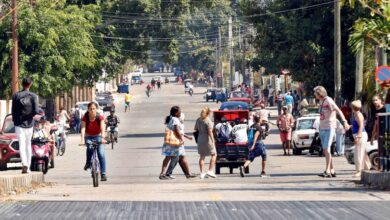El Salvador takes an important step in favor of the LGBTI community
The Central American country, like its neighbors, is behind in terms of minority rights, including the LGBTI sector, with respect to European or North American countries.

The Salvadoran government has launched the Institutional Policy for the Care of the LGBTI Population, and with it the Central American country seeks to take a step forward to guarantee the rights of this population, who suffer discrimination as well as other minorities. In the case of El Salvador, it is a significant advance, since it represents a victory for the LGBTI community when the government built this policy with them, although it does not respond to all the needs of this sector, it is a starting point to reach the level of other progressive countries.
Leer en español: El Salvador da un paso importante a favor de las personas LGBTI
In this policy, the government provides a framework for the protection of rights and access to services without discrimination. This was achieved through the Security and Access to Justice Table of the LGBTI Population, which is made up by the Salvadoran LGBTI Federation and various public institutions such as the General Inspectorate of Public Security and Intermediate Centers, the National Public Security Academy, the National Civil Police, and the General Directorate of Penal Centers. Studies were made to be clear about the needs of this minority and to be able to construct the policy correctly.
For the LGBTI community, it was important for the Salvadoran government to integrate international human rights standards IGNORE INTO the policy, with the future goal of achieving full rights such as the recognition of same-sex marriage. The Minister of Justice and Security, Mauricio Ramírez Landaverde, acknowledged that there is discrimination in the different instances of the Salvadoran government, which is why it was necessary to create this framework to begin to reverse the situation. El Salvador, like much of Latin America, has a majority of religious population that is, therefore, conservative, so that progress in terms of LGBTI rights has been slow; this is reflected in hate crimes, torture, discrimination, marginalization in the workplace and in health, among other aspects.
America is an unequal continent, both economically and socially. Therefore, progress in terms of LGBTI rights has been different, while same-sex marriage is already legal at the national level or in specific jurisdictions in Argentina, Uruguay, Brazil, Colombia, Canada, the United States, Mexico, Ecuador, and Chile, there are other cases where they do not have recognition or protection against discrimination of all kinds, such is the situation in Bolivia, Peru, Paraguay, Venezuela, the Caribbean, and a good part of Central America, with the notable exception of Costa Rica, which after consultation with the Inter-American Court of Human Rights (CID) has determined to recognize same-sex marriage, which could become a reality this year.
The Costa Rican case is representative, since it was the government of the Central American country that requested the IADC's consultation, so they complied with its response in favor of same-sex marriage. It was even questioned during the electoral contest, as one of the candidates, Fabricio Alvarado, rose in the polls thanks to his conservatism and for being evangelical and rejecting same-sex marriage. The elections gave the victory to the ruling candidate and the same-sex marriage follows its course to be legal in the country. The IADC resolution could open the door to the recognition of rights for the LGBTI community in other countries of the region. El Salvador has taken an important step and is on the right track.
Latin American Post | Luis Liborio
Copy edited by Laura Rocha Rueda





